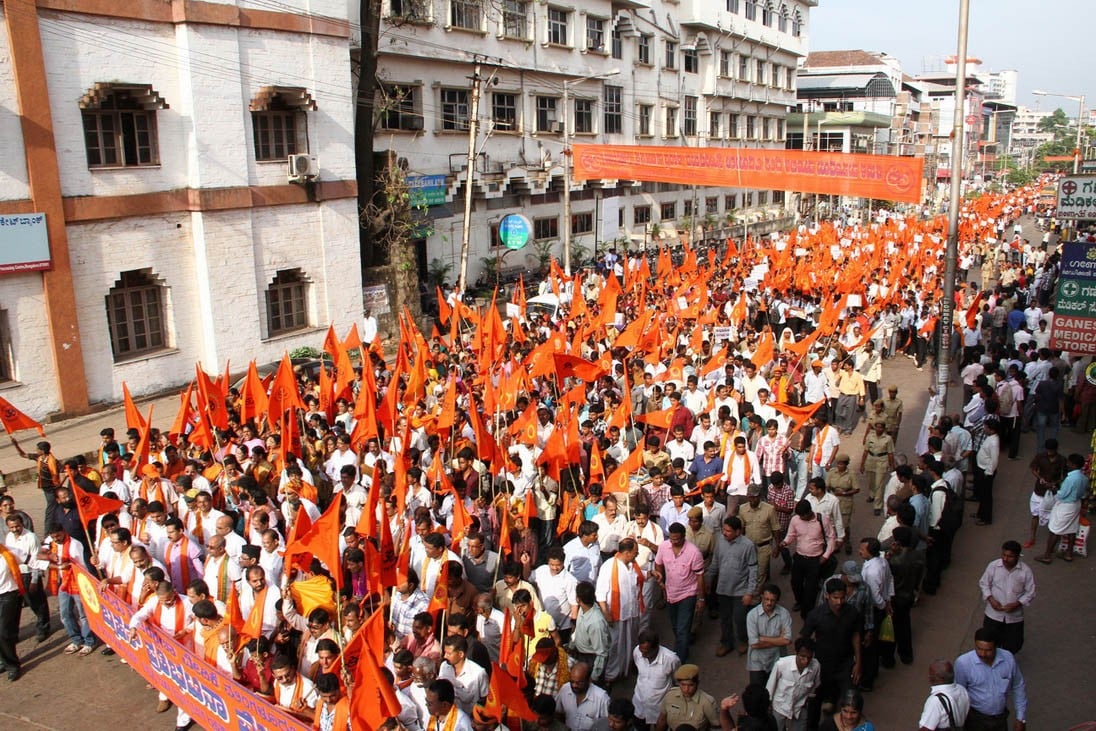
The communal violence in Pakistan and India is a natural consequence of colonial socio-political legacy

Communalism, a twisted offshoot of the extremist interpretation of religion, breeds in a fertile manmade atmosphere of strife. Though rationalising communalism is a futile exercise, it is especially pertinent in grasping the contours of communalism in Pakistan and India where it is not only institutionalised but celebrated as being akin to nationalism.
This celebration of communalism dates back to the colonial India, where the seeds of communalism were sown by the British in order to divide and rule India on communal grounds and slowdown the process of independence. Muslims, Hindus and Sikhs were divided on communal lines into smaller, manageable communities after the revolt of 1857 against the British. The colonial masters had discovered in religious diversity a tool that would create divisive Indian society.
Religious diversity projected with political motives bred communalism in a comparatively tolerant region damaging its faith-based harmony irreversibly. The communal violence we witness in large swathes of Pakistan and India these days is a natural consequence of colonial socio-political legacy which has its origins in the 19th and 20th century.
In the aftermath of the 2014 general elections in India, where BJP (Bharatya Janata Party) along with its ideological ally, the RSS (Rashtria Swayemsawek Sangh), the fountainhead of Hindutva, formed the national government, activists from India’s Left and secular corners are looking agitated at individual and collective level.
The apparent absence of a workable strategy to halt the surging menace of Hindu communalism has added to the political and ideological mess. Some are blaming the left for the quandary; others are holding the Congress party responsible for not countering Hindu communalism nor Hindutva’s ideological ally, the right wing Muslim clergy.
A close parallel to this recent conundrum in India is the military coup of 1977 in Pakistan by General Ziaul Haq -- the only difference being that General Zia was imposed on us by sheer military might while the Indians have imposed Narendra Modi upon themselves by electing him. Though, one is not competing for tragedies here, the Indian state, like Pakistan in 1977, has become a thinly concealed prompter of socially iniquitous agenda leaving its citizens to grapple with the physical manifestation of ascendant communalism.
Lynching, riots, propaganda and rape constitutes its naked face, often with the approval of the state. Though communalism has been a part of Pakistani politics and society since independence, General Zia still remains the champion of revolutionising communalism and engraining it in our educational system, law and society in general. The list of his accomplishments is never ending -- suspending basic constitutional rights, introducing controversial Hudood Ordinance thereby curtailing all civil liberties, a complete state censorship, using Saudi funded madrassas to fight the US war against the Soviet Union and introducing gun culture was enough to have future generations with blinkered vision. Left and democratic elements were crushed and political opponents were dealt with brutally. Public lashing, countless disappearances of political workers, writers, jurists and poets served a blow to the prospective progressive and modern state.
Desperate fulminations over the shrinking spaces of secular discourse in India bear unique resemblance with the atrocities by the Zia regime in Pakistan. The Indian state is stymieing human rights activists, mainly those that have managed to garner some intellectual resources to put up an effective ideological fight. Green Peace and countless other NGOs working in fields of environment, education, gender rights, with minorities, Dalits and tribal people are facing the state’s wrath.
In recent days, a new constituency of liberals has been added to the hapless lot with the institutional murder of Rohith Vemula, a Dalit student who committed suicide after his fellowship was revoked. A host of students and professors at JNU Delhi University, senior jurists including former Supreme Court judges, with their faith still intact in the promise of Indian constitution, have spoken up and resultantly have been dealt with by the Indian authorities in the same way as did their previous colonial masters, the British i.e. by using the ploy of sedition, which is a relic of colonial India. However, addressing institutionalised discrimination against India’s minorities is a complex problem that has no easy solution in sight.
The reasons for recent surge in the communal violence in Indian society are rooted in a deliberate strategy to promote power politics on the basis of religious exclusivity that negates all other elements of a society. One of the most effective ploughs for upholding communal imbalance in a society is the use of fringe groups for suppressing minorities and political opponents. RSS, Vishva Hindu Parishad and other extreme right Hindu parties proudly display their propensity in launching campaigns such as banning of beef and glorifying caste distinctions.
Lynching of those associated with beef trade highlights a clear message to the minorities and a large chunk of different Hindu castes of India in whose food beef constitutes an important component. Chief Minister of Haryana, Manohar Lal Khattar, went to the extent of saying: "Quit beef if you want to live in India".
Conversion campaigns such as ‘ghar wapsi’, literally meaning returning home, and ‘Love Jihad’, using force to stop Muslim youths from marrying Hindu girls, have replaced the secular discourse of the Indian society, resulting in a social paralysis. India today stands divided; its weakest elements fighting an ideological war. This may be something new for Indian democratic forces.
We in Pakistan have been in this kind of battle for long. Realisation of the vision of a democratic, secular and tolerant South Asia depends on the kind of struggle the enlightened forces wage against the obscurantists of all hues.